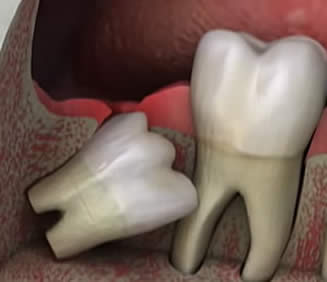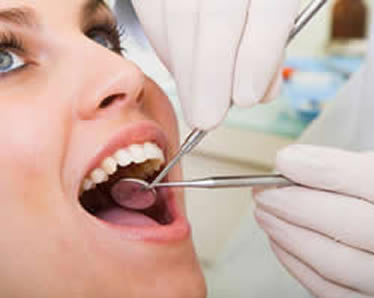Sep 28, 2017 | Blog, Dental Topics
You have planned your wedding day down to the smallest detail, but have you made sure your smile reflects the same perfection? One of the best ways for a bride or groom to put the final touch on their wedding day appearance is to improve the color and shine of their smile with professional teeth whitening. To make sure your smile is as white at the bride’s dress for your special day, there are a few suggestions to follow.
Locate a cosmetic dentist who has experience with professional teeth whitening treatments. In office teeth whitening offers dramatically better results than over-the-counter strips or toothpastes. In-office treatments like laser whitening can whiten your teeth up to ten shades in as little as one or two visits.
To make sure your treatment is complete and any sensitivity that may result has subsided, schedule your whitening treatments at least two weeks before your wedding day. This will ensure your dentist has time to achieve the most successful result.
Both during and after whitening treatment, take care to avoid pigment rich foods and beverages that are prone to cause staining. Avoiding coffee, tea, red wine, soda and other foods that are known to cause staining will help maintain your whitening results. If you must drink dark liquids, use a straw to keep the beverage from making contact with your teeth.
With professional teeth whitening treatment, you will have a dazzling, picture perfect smile that reflects the joy you feel as you walk down the aisle on your special day.
If you need a dentist in Conyers, contact us today
Sep 21, 2017 | Blog, Dental Topics
Root canal therapy is a painless procedure performed when decay has caused enough damage to a tooth that the tooth is dying or has already died. During treatment, your dentist or endodontist removes the diseased or damaged pulp from the tooth and then refills the tooth cavity.
To ensure a successful and pleasant treatment, here are some basic do’s and don’ts to follow:
- Do take any medication your dentist has prescribed for you to take prior to root canal therapy.
- Don’t anticipate pain; be calm and relaxed during your treatment.
- Do expect mild discomfort for 2-3 days following the procedure. Apply an ice pack and sleep with your head elevated to minimize swelling.
- Don’t skip on taking prescribed pain medications, even if you are not experiencing extreme pain.
- Do avoid biting on hard foods or meddling with the affected tooth during the course of treatment.
- Don’t drink excessively hot or cold beverages until the completion of treatment.
- Do continue normal brushing on the root canal treated tooth.
- Don’t smoke or drink alcohol within 24 hours of root canal therapy.
- Do eat a soft diet for several days and avoid chewing on the treated tooth until a permanent restoration is placed.
- Don’t delay having the treated tooth capped with a crown or other restoration to avoid fracture or additional damage, causing failure of your root canal therapy.
- Do contact your dental professional immediately should you have any complications or questions during your recovery, and make sure to keep any follow-up appointments scheduled by your dentist or endodontist.
Root canal therapy has a 95% success rate. By following these simple guidelines, you can help to ensure a positive result from your root canal therapy and enjoy many more years of a healthy smile.
If you need a dentist in Conyers, contact us today
Sep 14, 2017 | Blog, Dental Topics
A majority of people begin to grow wisdom teeth between the ages of 17 and 24. For some people, there are no complications, but in others the wisdom teeth never erupt. This can lead to swelling, gum ulcers and pain. If the wisdom tooth is impacted (stuck pressing up against another tooth) it can damage the other tooth or the jawbone. If you are one of the many people who have this problem, oral surgery to remove the wisdom teeth is recommended.
Because the word “surgery” can be a frightening one, you may feel anxious about proceeding, but with a little preparation you can go into your surgery feeling confident about the procedure and your recovery.
Timing is everything, and this applies to your oral surgery date. Allow yourself time to recover by scheduling your appointment on a Thursday or Friday so you can have the weekend to rest and recuperate.
Because you won’t want to leave the house during your recovery, be sure to go to the grocery store beforehand to stock up on soft foods such as yogurt, gelatin, cottage cheese, applesauce or pudding. Soups are good choices if they are served warm, not hot. Avoid foods that require a lot of chewing or that are crunchy.
Set up an area in your home where you can be restful. You won’t be sleeping the entire weekend, so get some movies, games and books to keep handy for entertainment. You might be in some discomfort in the days following your procedure, so it’s good to stay distracted.
You will need to have someone you trust to drive you to and from your dental appointment and to see that you get any prescriptions you require. Be sure to keep your medicine – antibiotics or painkillers – handy as you rest so you won’t have to get out of bed to find them. Wearing comfortable clothes to your appointment means that you can get right into bed when you get home.
Talk to your oral surgeon before your wisdom tooth surgery to see what other recommendations he or she has for you and your particular needs.
Schedule your appointment at our Conyers dental office
Sep 7, 2017 | Blog, Dental Topics
Though your dentist often reminds you about the need to brush in the morning and at night, most people may not understand the significance. Brushing twice a day is an important part of maintaining good oral health.
Consider these reasons to keep up your brushing habits:
One of the best ways to prevent cavities is fluoride. When you brush before bed, you apply a layer of fluoride on your teeth, which is the first line of defense while you sleep. In the morning, brushing right away helps strengthen that protection.
Your mouth contains harmful bacteria that produce plaque and weaken enamel. If you only brush once a day, these bacteria have 24 hours to wreak havoc on your teeth and gums, but twice-daily brushing cuts that time in half.
- Prevention of tartar build up
When plaque hardens, it becomes tartar. The only way to remove tartar once it forms is with a professional cleaning. By brushing twice a day, you can remove plaque before it can calcify and cause oral health problems like gum disease and tooth decay.
Frequent brushing helps stimulate gums and keep them healthy. If you don’t take good care of your gums, you risk developing periodontal disease, a serious oral health condition that can result in bone degeneration, receding gums, and tooth loss.
Nobody wants bad breath. Brushing twice a day helps remove food particles and the bacteria that can cause halitosis. For optimal freshness, consider brushing your tongue or using a tongue scraper.
We treat patients from Conyers and the surrounding area

Aug 28, 2017 | Blog, Dental Topics
If you didn’t have your wisdom teeth out as a young person, you may be wondering about having them out as an adult. Your dentist may have recommended that you prevent future infections, cysts or pain in the jaw due to wisdom teeth that are growing under other teeth – known as impacted teeth. Even a type of tumor has been linked to impacted wisdom teeth.
Impacted teeth result when the wisdom tooth grows up under an existing tooth. Sometimes, adults have wisdom teeth that come in completely straight behind back molars. In rare cases, one or more of these teeth don’t grow at all. An x-ray can reveal the presence of the teeth. Impacted teeth cause problems with existing teeth and must come out.
Because the roots of wisdom teeth typically fully develop near the age of 24, removing them after this time can be more complicated. Roots can entwine with facial nerves, making extraction problematic. It’s recommended that adults receive a CT scan of their jaw, showing the clear positioning of facial nerves and roots, something not shown by x-rays. If the roots of the lower wisdom teeth aren’t touching or wrapped around the alveolar nerve, extraction is still possible.
Adults with wisdom teeth are at higher risk for gum disease. Gum disease has been linked to an increase of pregnancy complication and other health issues. Previously believed only to affect patients in their late 30s, this gum disease is now being shown to affect much younger patients, especially young pregnant women. Growing evidence is also connecting gum disease to inflammation due to chronic infections in the body, leading to an increased risk of diabetes and heart disease.
Talk to your dentist today to see if you should have your wisdom teeth removed. Be honest about any symptoms you’re having, such as pain or pressure, and let the professional evaluate your specific situation.
Schedule your appointment at our Conyers dental office

Aug 21, 2017 | Blog, Dental Topics
If you have severely damaged, diseased or injured teeth, your dentist may recommend crown and bridge treatment. A crown is a dental restoration that fully covers a tooth and becomes the tooth’s new outer surface. A bridge is also a dental restoration that is anchored to natural teeth. However, a bridge replaces and fills the gap left by multiple missing teeth. Both crowns and bridges are made from a variety of materials and can be matched to the color of your natural teeth. Unlike removable dental devices like dentures, crowns and bridges are permanently affixed to existing teeth or implants allowing them to look and function similarly to natural teeth.
In addition to restored function and appearance, crowns and bridges offer a host of additional benefits including:
- Dental crowns protect and strengthen the natural tooth, helping you to avoid extraction.
- Crowns are the final step in root canal treatment, protecting the tooth from bacteria that could re-infect the treated tooth.
- Crowns and bridges restore missing teeth and support the remaining teeth.
- Your natural bite is restored and maintained with crown and bridge treatment.
- Placement of crowns and bridges improve your speech, smile and chewing function.
- Adjacent teeth are prevented from shifting and tilting with crown and bridge treatment.
- Crowns and bridges are long-lasting, predictable and durable.
- Placement of crowns and bridges is quick and can usually be completed in as little as two appointments.
- Alternatives to crown and bridgework, like dental implants, are usually more invasive requiring surgery and possibly bone grafting to place the implant.
Consult with your dentist to find out more about the advantages of crowns and bridges and how they can help to restore your healthy smile.
If you need a dentist in Conyers, contact us today


